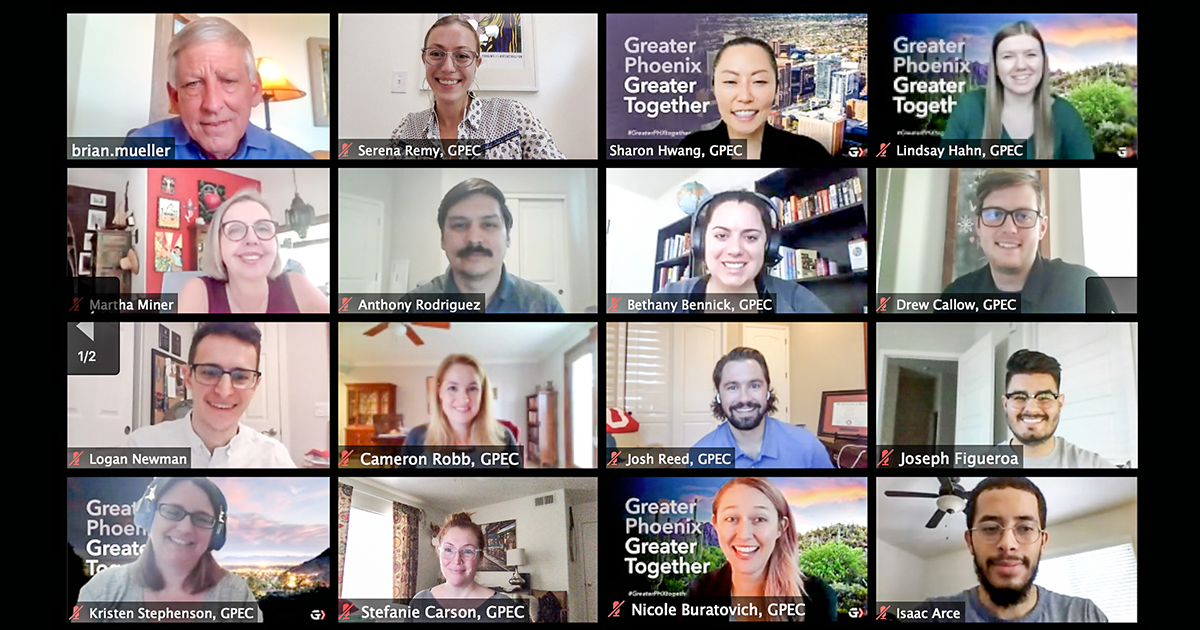

Fireside Chat: GCU’s approach benefits students, communities and the economy
Published: 10/06/2020
Built on a foundation of innovation within its business model, Grand Canyon University (GCU), a nonprofit Christian university in Phoenix, has continued its creative approach to not only educating its students, but helping the surrounding communities grow and thrive.
A strong talent pool is critical for companies evaluating relocating or expanding to the region. Greater Phoenix has an extremely competitive workforce in regard to training, quality and availability, while maintaining one of the lowest costs for labor in the nation. The region’s diverse workforce is fueled by globally recognized universities like GCU, who prepares highly qualified graduates for in-demand disciplines within established and emerging industries.
GCU President Brian Mueller joined our team Lunch and Learn to discuss the university’s growth, the businesses that have sprouted from the campus in the area of 33rd Avenue and Camelback Road, and the way their efforts have allowed the diverse community to prosper and gain access to education.
Over the last decade, GCU has expanded its presence. In 2009, there were about 1,000 traditional on-campus students. It surpassed 20,000 in 2018, the year the university was sold by Grand Canyon Education (GCE) and transitioned back to nonprofit status.
“Most people would have said if you’re going to invest 1.5 billion dollars … you don’t do it at 33rd Avenue and Camelback in Maryvale. You go to Scottsdale or Gilbert,” Mueller said. “We got really excited about being where we were.”
GCU has helped open businesses in the area that place an emphasis on hiring members of the community. Because these are GCU-owned establishments, children of those employees can get free admission if they qualify academically.
“We decided in 2011 that the university was going to be the economic catalyst that would drive change,” Mueller said.
More than 14,000 people in the area are employed by GCU.
To assist at-risk youth in the community, GCU started a tutoring program to help kids stay out of trouble during afterschool hours and qualify for admission, which requires a minimum of a 3.0 high school GPA.
Local students are invited to spend time in “learning lounges” dedicated to group learning and tutoring for K-12 students. GCU students who work in the GCU Learning Lounge are college scholars in math and reading, specially trained to work with K-12 students and passionate about serving others.
High school students who spend at least 100 hours per year in the lounge and achieve a 3.5 GPA can apply for a full-tuition scholarship from GCU.
“The big inequity here is not really what happens at the school. The big inequity is what happens between 3 o’clock and 8 o’clock where kids that live in Scottsdale get lots of help because they got two parents that went to college,” Mueller said. “The kids in our neighborhood, a lot of them don’t have anything close to that. Nobody is home when they get there because your parents are working two full-time jobs at minimum wage.”
These efforts have helped the university’s population better reflect the demographics of the area.
Mueller said 40% of students on campus are people of color. Four hundred students on GCU’s campus are part of the Deferred Action for Childhood Arrivals program, better known as DACA.
“One of the most exciting things is that (there is) no affirmative action plan, no policy, no marketing plan, but the campus became extremely diverse because it became affordable,” Mueller said.
There have been frozen tuition rates at GCU for 12 years in a row. Ground campus tuition is $16,500, and more than 90% of students receive scholarships that bring the average cost to around $8,700. Room and board are around $8,000.
The university built its cash reserves to allow this when it was public under GCE and has remained fiscally sound without depending on tax dollars as it continues to accept large numbers of students and invest in the community.
Going forward, GCU is working to continue expanding its business ventures around the university. The company has entered clothing and apparel production; it operates a hotel and a restaurant; it puts together its own textbooks for university professors, to which they sell to students at under-retail prices.
GCU has even entered the golf sphere, taking over operations of debt-filled Maryvale Municipal Golf Course in 2016 to keep it in business and hire more community members, all of whom can get free or reduced tuition for family members.
“We started 12 new businesses and we’re just going to keep doing it,” Mueller said. “We look at everything that we do, and every vendor that we have, and if we can start a business and produce the product or produce the service ourselves, we’re going to do it.”
The university has also worked with police to cut crime in the area, and its involvement with Habitat for Humanity has contributed to a housing value increase of 302% from 2011 to 2019.
“We’re trying to get immigrant families into those homes and immediately improve them because it’s the quickest way for them to build wealth and to be part of the appreciation of those properties,” Mueller said.
Efforts ranging from housing to job creation to increased access to education has allowed GCU and the area to develop.
“The exciting thing for us is that our students completely embrace this. They want to be part of it,” Mueller said. “They can see first-hand that we don’t need to have inner cities in this country. That they can be transformed, but the government can’t do it. There needs to be an economic catalyst.”